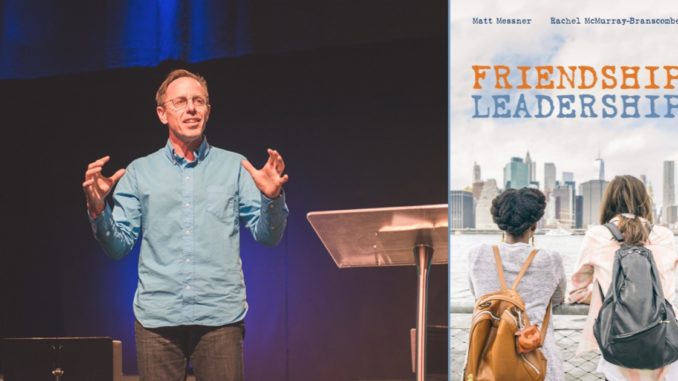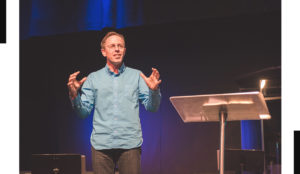
Podcast (beyond-the-page): Play in new window | Download
Subscribe: Apple Podcasts | RSS
A few months ago, I began a doctoral program in ministerial leadership. The overarching project for the degree is a dissertation on any subject related to leadership and ministry. After a month of prayer and consideration, I began to focus on clergy’s role of friendship within the church. I remember being shocked a decade ago when I interviewed a pastor for an undergraduate ministry class and he said that he had no close friends in the church he served. It’s a statement that’s stuck with me and a philosophy I’ve seen lived out based on personal, congregational, denominational, or cultural expectations. Pastors are generally seen as separate from the community they serve. But what if we have it wrong?
Early on in my research, I came across Matt Messner’s 2018 book Friendship Leadership. Well, I actually came across his 2005 doctoral dissertation on the subject first, but soon leapt into this exploration of friendship as a leadership methodology. I was able to track Matt down—in an unexpected turn of events he is the brother-in-law of my longtime friend and NYT bestselling author Eric Wilson—and the result is this conversation.
The Conversation | Friendship Leadership
This excerpt has been lightly edited for clarity.
Josh Olds: Let’s begin with hopefully an easy question. Well, it may not be such an easy question because you wrote an entire book about it, but it’s very foundational. When you talk about “friendship leadership” what do you have in mind?
Matt Messner: Yeah, for me, it is a paradigm of leadership or a way of seeing people and a way of thinking as a leader about the people that you’re leading. That’s probably the best way I would describe it. So when you hear “friendship leadership,” it is to bring the qualities that make friendship into your life as part of the lens through which you view people, through which you view your organization. And it helps dictate your relationships, your decisions. How you feel about the people you’re leading…all of those things? I’d say a paradigm of leadership is really what it is.
Josh Olds: In Christian circles, we talk a lot about servant leadership. And there is a big difference between a servant and a friend. What was it for you that made you begin to say, “You know, I don’t know that this servant imagery is exactly what we want?” Like, obviously, Scripture does use that imagery to some extent. When did you first start to see this need for friendship and develop this paradigm?
I couldn’t dismiss the powerful influence that friends have had on my life.
Matthew Messner: Yeah, it was one of those things I’d never really put my finger on. It’s just something I had experienced. Because I’ve always embraced servant leadership and considered it extremely valuable. I’d been taught that, you know, the Scriptures are clear where Jesus points is towards it. And many books have been written on it. So, I’ve I understood servant leadership, but the more I studied leadership, and even the definitions of leadership, you know, most simply, even the definition of leadership is being influenced. I couldn’t dismiss the powerful influence that friends have had on my life.
And when I was really even just kind of judging the influences in my life, there was no doubt that the people with whom I’d had friendship were the greatest influencers upon my own life. And so that was a reality that I came to grips with, or I think I even just subconsciously understood. But one of those friends really kind of started having conversations with me about this thesis or this theory, particularly as it relates to the example of Christ. So out of that, then, came further conversations and research. Surprisingly, to me, though, there was not much written on this particular topic. It’s not been developed as a leadership theory. And that surprises me, because I think once you look at it and see it, it’s a very obvious biblical way of doing leadership.
The Book | Friendship Leadership
 No one can deny that friendships are powerful relationships of influence. Why not strategically incorporate friendship within a philosophy of leadership? People long for relational models of leadership, yet few specific methodologies have been developed.
No one can deny that friendships are powerful relationships of influence. Why not strategically incorporate friendship within a philosophy of leadership? People long for relational models of leadership, yet few specific methodologies have been developed.
This book examines the friendship of God with humanity, and the leadership of Jesus with his disciples, to whom he declared, “I no longer call you servants . . . Instead, I have called you friends” (John 15:15). In response to this enduring example of the Divine bringing together both friendship and leadership, this book presents an unexplored model of leadership for the Christian practitioner: Friendship Leadership.
The authors of Friendship Leadership share research, historical examples, and their personal experiences with this leadership model, as they describe both the trials and triumphs. Through this process, the book addresses the primary barriers a leader might experience when utilizing the Friendship Leadership model. Finally, the authors offer a guide for how to incorporate friendship into their leadership, strengthening others as they follow the example of our great Leader. The result is a transformational way of leading that nurtures relationships.
The Author | Matthew Messner
 Matt Messner is the Lead Pastor of Eureka Faith Center (www.eurekafaithcenter.org).
Matt Messner is the Lead Pastor of Eureka Faith Center (www.eurekafaithcenter.org).
Matt has served as the Divisional Superintendent for the Redwood Division of Foursquare Churches and is the President of North Coast Bible Institute. He has taught at Fuller Theological Seminary, Bakke Graduate University, LIFE Pacific College, King’s College and Seminary, and is on the faculty of Perspectives on the World Christian Movement. Matt earned his B.A. at LIFE Pacific College, an M.A. from Fuller Theological Seminary and a D.Min. from Gordon-Conwell Theological Seminary. His dissertation is entitled Leadership that Cares: How Intentional Friendship Revolutionizes Leadership.
Faith Center’s ministry includes a recovery ministry, an accredited ministry training institute, radio and television ministries, ministry through the arts, homeless outreach, and jail ministries. Pastor Matt Messner is a visionary leader with a history of empowering and mobilizing others into a force for the Gospel of Jesus Christ. He is an inspirational communicator with a capacity to bring deep Biblical truths to life.
During his free time Matt enjoys surfing, coaching track and cross country at Eureka High School, and exploring the redwoods.
Matt met his best friend and partner in ministry, Heidi Wilson Messner, while at LIFE Pacific College and they have been married for over 25 years. Heidi serves as co-pastor, Area Superintendent, and is on the Eureka City Council. They have two adult children, Alicia and Levi.
